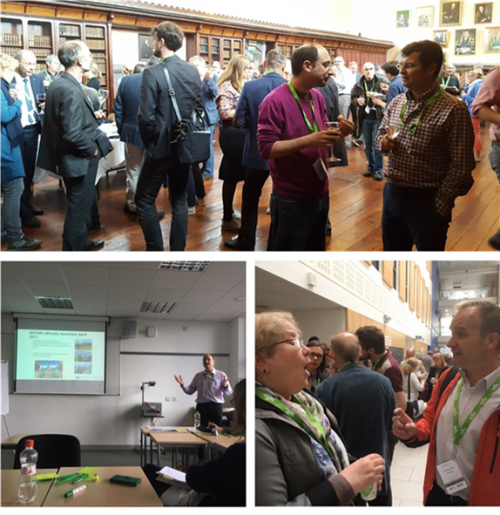We weren’t altogether sure we were in the right conference as the chair announced that: “The next session is going to involve some role play.”
You might have thought that was the cue for a swift exit. And indeed it was, though only temporarily, and only to allow for the opportunity to discuss with some other conference attendees the intricacies of what “Technology Assessment” actually was.
This was up for discussion as we were representing SEFARI in Ireland at the 3rd European Technology Assessment Conference at University College Cork.
It didn’t escape our notice that in our roles with SEFARI as Sector Leads on Livestock (Philip Skuce) and Soil and Crops (Kenneth Loades) we are tasked with trying to demystify research for non-experts, but here we were, a little bamboozled ourselves. Despite reassurances from our Director, Graeme, before we attended, neither of us were altogether sure what ‘Technology Assessment’ was!
It transpires that Technology Assessment represents all aspects of knowledge exchange around science, whether that be public engagement, or construction of responsible research agendas with citizens and stakeholders. It also includes the communication of the opportunities, and risks, of scientific research to those in government and parliament. So essentially what we at SEFARI are all about!
The conference was organised by a number of fellow Research Institutes in Europe and this is why we chose to go. There are many reasons why building further links with colleagues across Europe is important, and understanding best practice on how they get their messages across on complex science is just one of them. We were eager to learn and expand our networks.
The critical mass of Research Institutes involved with Technology Assessment seems to sit within mainland Europe, notably The Netherlands, Austria and Germany, but there were also representatives there from the UK Parliamentary Office of Science & Technology (POST)and the Open University. The conference explored many aspects of communicating science to different audiences, how different countries organise this, what works and what doesn’t, and how you go about measuring the impact of knowledge exchange.
We had the opportunity to blow our own trumpet too – we had a slot in the session on ‘best practice’ and took the opportunity to introduce SEFARI, followed by explanation and promotion of the newly-formed collective in an international context. What was clear was that SEFARI is unique in its role in delivering to so many audiences.
There was a series of plenaries, short talks and workshops from which we learned a lot – for example, one very interesting session was on ‘horizon scanning’ (i.e. what’s next?) which, from a SEFARI perspective, highlights the value of us assigning some funding for the exploration of national and global challenges through our Think Tank initiative.
While in Cork, we also took the opportunity to gatecrash attend the All-Island Agri-food Summit, which was taking place nearby. The organisers were very accommodating and allowed us to sit in on very informative lectures from Prof Chris Elliott, an acknowledged international expert on global food security and a similarly stimulating presentation from Dr Helena McMahon from Taste of Science, Ireland. We took advantage of the networking opportunity afterwards to introduce and promote the work of SEFARI on agri-food in Scotland, and to foster collaboration with our Irish counterparts.
The conference allowed us to highlight SEFARI work and understand how different countries approach similar challenges in technology assessment. We are already discussing topics raised at the conference within SEFARI and how we can implement some of the ideas we picked up. As the conference closed there was talk of the location for the next meeting, people were keen for Edinburgh………watch this space!
Dr Kenneth Loades and Dr Philip Skuce, Sector Leads ¦ SEFARI Gateway
